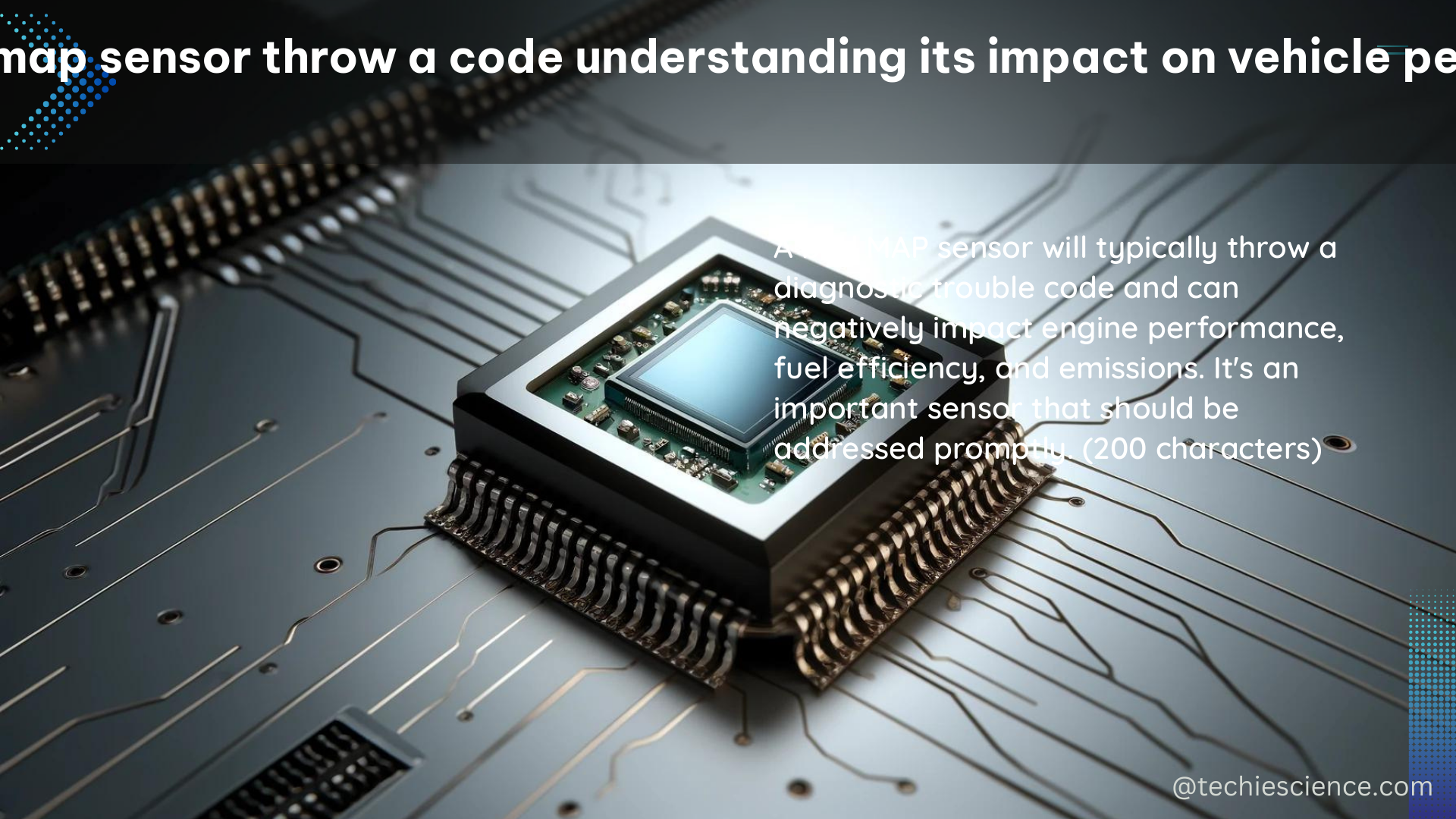A malfunctioning Manifold Absolute Pressure (MAP) sensor can have significant consequences on a vehicle’s performance, often leading to the illumination of a diagnostic trouble code (DTC) in the vehicle’s onboard computer. Understanding the role of the MAP sensor and the potential issues it can cause is crucial for maintaining optimal engine operation and preventing further damage to the vehicle.
The Role of the MAP Sensor
The MAP sensor is a critical component in the engine management system, responsible for measuring the absolute pressure within the intake manifold. This information is then relayed to the Powertrain Control Module (PCM), which uses it to determine the appropriate amount of fuel to inject into the engine cylinders.
The MAP sensor measures the pressure difference between the intake manifold and the outside atmospheric pressure. This pressure difference is directly related to the engine’s load, as the intake manifold pressure decreases when the engine is under load (e.g., during acceleration) and increases when the engine is at idle or under low load.
Symptoms of a Bad MAP Sensor

When the MAP sensor is not functioning correctly, it can cause a range of performance issues and trigger diagnostic trouble codes. Some of the most common symptoms include:
-
Engine Misfiring: A faulty MAP sensor can cause the engine to misfire, as the PCM is unable to accurately determine the correct air-fuel ratio. This can lead to rough idling, hesitation, and a loss of power.
-
Poor Fuel Efficiency: Inaccurate MAP sensor readings can cause the engine to run either too rich (too much fuel) or too lean (too little fuel), resulting in decreased fuel efficiency and increased emissions.
-
Rough Idling: A bad MAP sensor can cause the engine to idle roughly or unevenly, as the PCM is unable to maintain the proper air-fuel mixture at idle.
-
Stalling: In severe cases, a malfunctioning MAP sensor can cause the engine to stall, particularly during acceleration or when the engine is under load.
-
Diagnostic Trouble Codes: When the MAP sensor is not functioning correctly, the PCM will typically set a diagnostic trouble code, such as P0105 (MAP sensor circuit malfunction), P0106 (MAP sensor range/performance problem), or P0107 (MAP sensor low input).
Potential Causes of MAP Sensor Failure
There are several potential causes for a MAP sensor to fail or provide inaccurate readings, including:
-
Vacuum Leaks: Vacuum leaks in the intake system can affect the pressure readings from the MAP sensor, leading to incorrect air-fuel ratio calculations.
-
Electrical Issues: Problems with the wiring, connectors, or the MAP sensor itself, such as a short circuit or an open circuit, can cause the sensor to malfunction.
-
Physical Damage: The MAP sensor can be damaged by physical impacts, exposure to extreme temperatures, or the buildup of debris or contaminants.
-
Sensor Drift: Over time, the MAP sensor’s calibration can drift, leading to inaccurate pressure readings. This is more common in older vehicles or those with high mileage.
Diagnosing and Repairing a Bad MAP Sensor
Diagnosing a faulty MAP sensor typically involves using a diagnostic scanner to read any diagnostic trouble codes and perform a series of tests to verify the sensor’s operation. This may include checking the sensor’s voltage output, resistance, and response to changes in manifold pressure.
If the MAP sensor is found to be malfunctioning, it will need to be replaced. The cost of a replacement MAP sensor can range from $50 to $180, depending on the vehicle make and model, as well as the labor required for the repair.
It’s important to note that driving with a bad MAP sensor is not recommended, as it can lead to further engine performance issues and potentially cause damage to other vehicle components, such as the catalytic converter or the exhaust system. Prompt diagnosis and repair of a faulty MAP sensor is crucial to maintaining the overall health and performance of the vehicle.
Preventive Maintenance for the MAP Sensor
To help prevent issues with the MAP sensor, it’s important to perform regular maintenance and inspections, including:
-
Checking for Vacuum Leaks: Regularly inspect the intake system for any signs of vacuum leaks, which can affect the MAP sensor’s readings.
-
Cleaning the Sensor: Over time, the MAP sensor can become clogged with debris or contaminants, which can impact its accuracy. Carefully clean the sensor according to the manufacturer’s instructions.
-
Avoiding Overtightening: When reinstalling the MAP sensor or any nearby components, be careful not to overtighten the bolts or connectors, as this can damage the sensor.
-
Monitoring for Trouble Codes: Regularly check the vehicle’s diagnostic trouble codes to identify any issues with the MAP sensor or the engine management system.
By understanding the role of the MAP sensor and taking proactive steps to maintain it, you can help ensure your vehicle’s optimal performance and avoid costly repairs down the line.
References:
- CarFromJapan. (2023, July 18). Detect Bad MAP Sensor Symptoms: Prevent Severe Issues. Retrieved from https://carfromjapan.com/article/car-maintenance/detect-bad-map-sensor-symptoms/
- CarParts.com. (2024, January 23). Bad MAP Sensor Symptoms – In The Garage with CarParts.com. Retrieved from https://www.carparts.com/blog/is-it-safe-to-drive-with-a-bad-map-sensor/
- AnandTech Forums. (2013, January 5). Does a bad MAP sensor have long lasting effect on vehicle? Retrieved from https://forums.anandtech.com/threads/does-a-bad-map-sensor-have-long-lasting-effect-on-vehicle.2293977/
- Delphi Technologies. (n.d.). Making sense of your sensors: MAP sensor. Retrieved from https://www.delphiautoparts.com/resource-center/article/making-sense-of-your-sensors-map-sensor
- eEuroparts. (2023, September 22). P0106 Code Explained — MAP Sensor Problems. Retrieved from https://eeuroparts.com/blog/p0106-code-explained-map-sensor-problems/

The lambdageeks.com Core SME Team is a group of experienced subject matter experts from diverse scientific and technical fields including Physics, Chemistry, Technology,Electronics & Electrical Engineering, Automotive, Mechanical Engineering. Our team collaborates to create high-quality, well-researched articles on a wide range of science and technology topics for the lambdageeks.com website.
All Our Senior SME are having more than 7 Years of experience in the respective fields . They are either Working Industry Professionals or assocaited With different Universities. Refer Our Authors Page to get to know About our Core SMEs.